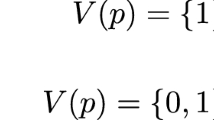Abstract
This paper studies the Lockean thesis from the perspective of contemporary epistemic logic. The Lockean thesis states that belief can be defined as ‘sufficiently high degree of belief’. Its main problem is that it gives rise to a notion of belief which is not closed under conjunction. This problem is typical for classical epistemic logic: it is single-agent and static. I argue that from the perspective of contemporary epistemic logic, the Lockean thesis fares much better. I briefly mention that it can successfully be extended from single-agent to multi-agent settings. More importantly, I show that accepting the Lockean thesis (and a more sophisticated version for conditional beliefs) leads to a significant and unexpected unification in the dynamic behavior of (conditional) belief and high (conditional) probability with respect to public announcements. This constitutes a methodological argument in favor of the Lockean thesis. Furthermore, if one accepts Baltag’s Erlangen program for epistemology, this technical observation has even stronger philosophical implications: because belief and high probability display the same dynamic behavior, it is plausible that they are indeed one and the same epistemic notion.
Similar content being viewed by others
References
Aumann R. (1976) Agreeing to disagree. Annals of Statistics 4: 1236–1239
Baltag A. (2008) Interview. In: Hendricks V. F., Pritchard D. (Eds.) Epistemology: 5 Questions. . Automatic Press, London, pp 21–37
Baltag, A. (2011). Research profile. Available online at the author’s website: http://alexandru.tiddlyspot.com/.
Baltag A., Moss L. S. (2004) Logics for epistemic programs. Synthese 139: 1–60
Baltag A., Smets S. (2008) A qualitative theory of dynamic interactive belief revision. In: Bonanno G., van der Hoek W., Woolridge M. (Eds.) Texts in Logic and Games. Amsterdam University Press, Amsterdam, pp 9–58
Barwise, J. (1988). Three views of common knowledge. In TARK ’88 Proceedings of the 2nd Conference on Theoretical Aspects of Reasoning about Knowledge. San Francisco: Morgan Kaufmann.
Dégremont, C. & Roy, O. (2009). Agreement theorems in dynamic-epistemic logic. In X. He J. Horty & E. Pacuit (Eds.), Logic, Rationality, and Interaction. LORI 2009 Proceedings, LNAI 5834. (pp. 105–118). Springer.
Demey, L. (2010). Agreeing to disagree in probabilistic dynamic epistemic logic. Master’s thesis, ILLC, Universiteit van Amsterdam.
Demey, L. (2011a). The dynamic phenomenon of surprise. An analysis in probabilistic dynamic epistemic logic. Manuscript.
Demey L. (2011b) Some remarks on the model theory of epistemic plausibility models. Journal of Applied Non-Classical Logics 21: 375–395
Douven I., Meijs W. (2007) Measuring coherence. Synthese 156: 405–425
Dubois D., Prade H. (2009) Accepted beliefs, revision and bipolarity in the possibilistic framework. In: Huber F., Schmidt-Petri C. (Eds.) Degrees of Belief. Springer, Berlin, pp 161–184
Eels E., Fitelson B. (2000) Measuring confirmation and evidence. Journal of Philosophy 97: 663–672
Fagin R., Halpern J. (1994) Reasoning about knowledge and probability. Journal of the ACM 41: 340–367
Foley R. (1992) The epistemology of belief and the epistemology of degrees of belief. American Philosophical Quarterly 29: 111–121
Goldman A. (1979) What is justified belief?. In: Pappas G. S. (Eds.) Justification and Knowledge. . Reidel, Dordrecht, pp 1–23
Goldman A. (1999) Knowledge in a Social World. Oxford University Press, New York
Halpern J. Y., Moses Y. (1990) Knowledge and common knowledge in a distributed environment. Journal of the ACM 37: 549–587
Halpern J. Y., Samet D., Segev E. (2009) Defining knowledge in terms of belief the modal logic perspective. Review of Symbolic Logic 2: 469–487
Hintikka J. (1962) Knowledge and Belief. An Introduction to the Logic of the Two Notions. Cornell University Press, Ithaca
Huber, F., Schmidt-Petri, C. (Eds.) (2009) Degrees of Belief. Springer, Berlin
Jeffrey R. (1983) The Logic of Decision (2nd edition). University of Chicago Press, Chicago
Kajii A., Morris S. (1997) Common p-belief: The general case. Games and Economic Behavior 18: 73–82
Kooi B. (2003) Probabilistic dynamic epistemic logic. Journal of Logic, Language and Information 12: 381–408
Lewis D. (1969) Convention. Harvard University Press, Cambridge
Monderer D., Samet D. (1989) Approximating common knowledge with common beliefs. Games and Economic Behavior 1: 170–190
Spohn W. (2009) A survey of ranking theory. In: Huber F., Schmidt-Petri C. (Eds.) Degrees of Belief. Springer, Berlin, pp 185–228
van Benthem J. (2007) Dynamic logic for belief revision. Journal of Applied Non-Classical Logics 17: 129–155
van der Hoek W., van Linder B., Meyer J.-J. (1999) Group knowledge is not always distributed (neither is it always implicit). Mathematical Social Sciences 38: 215–240
van Ditmarsch H., van der Hoek W., Kooi B. (2007) Dyamic Epistemic Logic. Springer, Berlin
Williams M. (2001) Problems of Knowledge. A Critical Introduction to Epistemology. Oxford University Press, New York
Author information
Authors and Affiliations
Corresponding author
Rights and permissions
About this article
Cite this article
Demey, L. Contemporary Epistemic Logic and the Lockean Thesis. Found Sci 18, 599–610 (2013). https://doi.org/10.1007/s10699-012-9292-9
Published:
Issue Date:
DOI: https://doi.org/10.1007/s10699-012-9292-9




